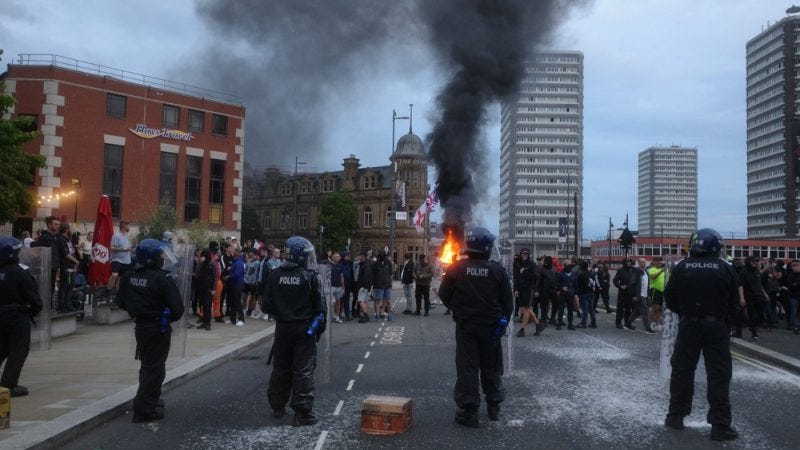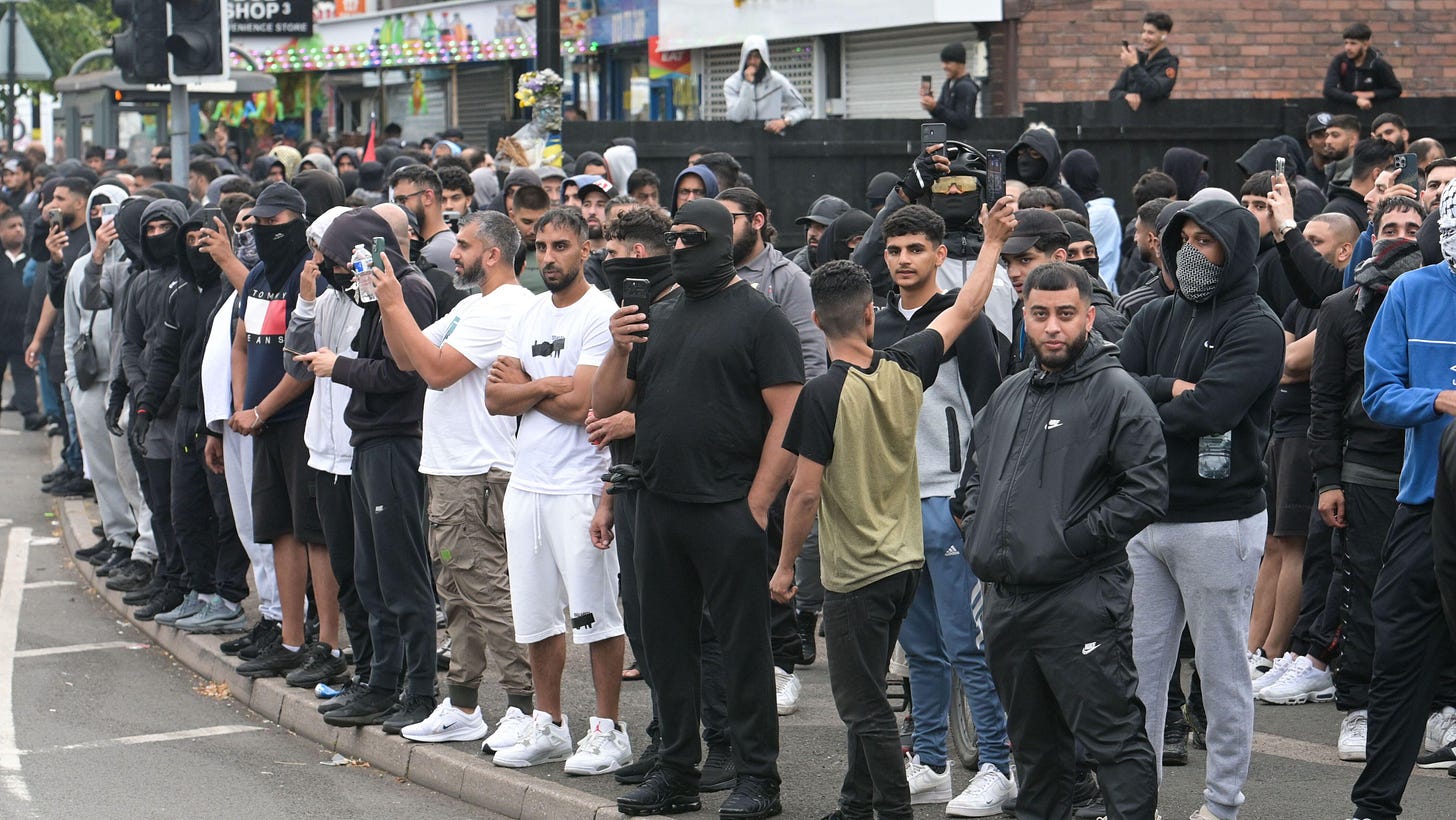Conversations About The Recent Unrest With My White Working Class Family And Friends
Some thoughts about what they thought and how they felt
Even before the recent unrest, I felt the ‘White Working Class’ were in many ways unfairly maligned. Stereotyped as Karens and Gammons, as chavs, racists and idiots, there is little to love and lots to hate about them. When other groups are reduced to similarly derogatory stereotypes, we rightly condemn it. Yet when it’s the White Working Class, no-one bats an eye.
As someone who is White and from a Working Class background and whose family and friends are White Working Class, I know first-hand that very few match the stereotypes. Stereotyping them in this way is as unfair as it is demeaning.
Nonetheless, stereotypes about the White Working Class have been in full force in the political and public spaces following the recent unrest that has spread across the country in the wake of the killing of three small girls in Southport.
Since then I’ve spoken to various (White Working Class) family members and friends about what was going on. Given how interesting its been, I thought I’d post some of their thoughts and feelings here. It is important to stress that these were only informal conversations with those close to me and are in no way representative of anyone except them.
One of the first things to emerge from the conversations was the zero support for the unrest and those involved. While some thought it was disrespectful to the memory of the three girls, others dismissed the unrest as opportunistic. One suggested those involved had nothing better to do.
Some responded with humorous despair with one suggesting the person who looted Greggs needed to aim higher in life. Another said the only reason some were looting Shoe Zone was to try and beat the Back to School rush in the last two weeks of school’s summer holidays.
There was a similar lack of support for the attacks on hotels housing asylum seekers and those on mosques. Unequivocally condemned, those doing so were branded idiots and imbeciles among others. One spoke bout how they ‘don’t understand what goes through people’s heads’
The topic of immigration did however come up, some expressing concerns about the number of migrants coming to the country and who those migrants might be. In terms of numbers, there was concern about the strain being put on the country’s public services especially the NHS. One added that this hadn’t been helped by more than a decade of austerity policies. Another expressed concern about where everyone was going to live given we already have a housing crisis.
Some who live in Birmingham did also speak about the large group of Muslim men - some of whom were carrying weapons - that had gathered a few nights beforehand. Given they lived nearby, they spoke about how it had put them ‘on edge’. This was made worse when they saw on social media that some had been attacking cars driven by White people and had also attacked a White man in a nearby pub. They said this had made they fear for their safety and that of their families.
We also spoke about Keir Starmer describing the unrest as “far-right thuggery” and the mainstream media naming the unrest the ‘far-right riots’. the response was mixed. While some said that blanketly accusing everyone involved as ‘far-right’ was ‘nonsense’. Another called Starmer a hypocrite as those he was accusing of being ‘far-right’ were merely parroting many of the things that politicians from all political parties had been saying about immigration and Muslims for more than a decade. Some thought that calling everyone ‘far-right’ was a way of ‘shutting down debate’ while others saw it as being intended to ‘demonise’ the White Working Class.
There was a very real sense of dissatisfaction with Starmer despite almost everyone I had spoken to were known Labour supporters. Comments about him ranged from calling him ‘Tory Light’ through to ‘he fucks me off’. Some spoke about how it wasn’t only Starmer who was a problem, so too was the Labour Party. As they put it, the Labour Party had abandoned the working classes a long time ago. None felt that any of the mainstream political parties cared about ordinary people.
I jokingly asked whether Tommy Robinson might be the answer. None thought he was. As one put it, he ‘pisses me off’; another said he was a low-rate Nigel Farage. Everyone who was asked had an opinion about Robinson. These included Robinson being described as a ‘stooge’ who had been put in place to stoke fear and exacerbate certain situations. Another said he was only interested in himself and his own personal gain. There was complete despair at Robinson being seen as the ‘voice of the White Working Class’. ‘He doesn’t speak for me’ was the collective response.
‘No-one speaks for us’ said one. Another responded, ‘no-one listens to us either’. Which made me think about a piece of research I did more than a decade ago. The research set out to investigate opposition to the building of a new mosque in the town of Dudley. For those who don’t know, Dudley is a post-industrial town in the West Midlands region of the England north of Birmingham. The town looks and feels run-down and has relatively high levels of depravation, As part of the research, I interviewed slightly over 50 people from the surrounding area, the majority of whom identified as White and Working Class which reflected the local demography.
As might have been expected, some who opposed the building of the mosque were overtly ‘racist’ and/or ‘Islamophobic’. However, this was far from true of everyone. Around a third of those interviewed opposed to the mosque for what I categorised at the time, ‘legitimate opposition’. A good example of this was how some opposed the mosque on the basis the planning application failed to comply with legislation about brown land development.
Despite their legitimate opposition, some spoke about gravitating towards the far-right after they had joined certain Facebook groups and other online forums set up by them to garner support for its own opposition to the mosque. When asked why, the answer was simple: it was because the far-right listened to them.
This was what made the difference. As they explained, not only had they been ignored by all the main political parties for decades but when they reached out to local councillors from those same political parties, they were instantly dismissed as ‘racists’ and ‘Islamophobes’.
The far-right therefore was able to capitalise on the void that was left by the mainstream political parties.
While the situation and circumstances are vastly different, there does seem to be at least some resonance between what happened in Dudley and what might happen across the country in the aftermath of the current unrest. It doesn’t take too much of a stretch of the imagination to see the far-right filling the void in places where they feel abandoned and ignored by the Government and others.
Given there was zero appetite for the far-right among my family and friends, I any will find themselves gravitating in that particular direction any time soon. The same however will not be true for others.







